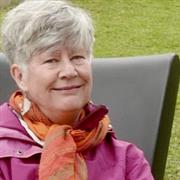MA in Museum Education
The Master of Arts (MA) in Museum Education is designed for those interested in pursuing careers in art, history, science, and children's museums. The two-year, 11-course program is flexible to accommodate students' needs and interests, and a part-time option is also available. Each student takes five required museum studies courses, including a supervised museum internship, two required education courses, and four electives relating to the discipline of the student's area of interest.
The Museum Education program at Tufts stands apart from other museum studies programs because of the community created from an interdisciplinary structure. You will join a group of approximately 35 emerging professionals with varied interests and skills who may become part of your lifelong network of colleagues and friends.
The program prepares graduates to find their places at the cutting-edge of the interesting and varied field of museum education. Museum educators are:
- Helping museums find new roles in fostering community, addressing social issues, and providing forums for multiple views and voices.
- Designing and conducting programs for toddlers, families, policemen, doctors-in-training, parolees, those with dementia and more, and they facilitate lifelong learning by teaching visitors make their own connections and meanings.
- Serving on exhibition development teams, working with community groups, creating in-museum and Internet learning resources, conducting in-person and distance learning programs, and directing departments and museums.
Office of Graduate Admissions
We invite you to learn more about this program.
Message from Program Director
Cynthia Robinson
Director, Museum Education Program
Certificate Program
The Certificate Program is designed for recent college graduates, career changers, and those who currently work in museums. Courses teach new skills and address current trends in the field. Students take four courses and a practicum, and although this program does not lead to a master's degree, courses taken as a certificate student can be applied to the master's program in Museum Education if the student is admitted into the MA in Museum Education program.
Courses and Requirements
33 credits are required for the MA in Museum Education with the following course distribution:
5 Museum Studies Courses
- Museum Foundations Course:
ED 285: Museums Today: Mission and Function - Museum Education Foundations Course:
ED 280: Museum Teaching and Learning in the Museum - Museum Curriculum Course:
ED 281: Museum Education for K-12 Audiences - Seminar:
ED 282: Proseminar in Museum Interpretation - Museum Practicum:
ED 284: Practicum in Museum Education
2 Education Courses (one from each category)
Education Foundations Course:
- ED 161: Anthropology and Sociology of Schooling
- ED 162: Critical Histories of U.S. Education
- ED 163: Philosophies of Education
- ED 167: Critical Race Theory Seminar
- ED 168: Pedagogies
- CSHD 234: Children, Nature, and the Development of Earth Stewards
- DEIJ 247: Diversity and Inclusion Leadership
- DEIJ 248: Organizational Change, Leadership and Influence
Psychology of Development and Education:
- ED 130: Human Development and Learning
- ED 142: Education of the Exceptional Child
- CSHD 166: Child’s Play
- CSHD 177: Bilingual Studies U.S.
- CSHD 211: Contemporary and Critical Perspectives on Child Development
- DEIJ 237/CSHD 262: Cultural Sensitivity
4 Electives, as determined with your advisor
Program Objectives
- Understanding of museum issues in the 21st century across the spectrum of museum types, and familiarity with all aspects of museum operations and how they support audiences and collections
- Understanding of learning and human development theories that influence museum education practice
- Ability to assess the various needs, preferences, and learning levels of multiple museum audiences
- Ability to interpret primary and secondary sources, including visual and material culture, quickly and critically and to reshape it, through exhibitions, public programs, school programs, new media, and written materials, for a variety of audiences
- Basic knowledge of the discipline of the museum field of choice (such as art history, American history, science, natural history, etc.)
- Ability to plan and implement museum-school and public programs from concept, curriculum development, budgeting and marketing to teaching and evaluation
- Understanding of the importance of evaluation and basic skills in designing and conducting evaluation studies
- Ability to write for a variety of audiences at different learning and reading levels
- Ability to advocate for an idea, project, or program to colleagues, donors, and funding agencies
- Application of skills and knowledge gained through coursework to the real-world setting of a museum
Student and Alumni Perspectives
Eric Carstens, Masters, Museum Education, 2021, speaking about 'Beyond Science'
Watch more: Video Perspectives and Peek Inside a Classroom
